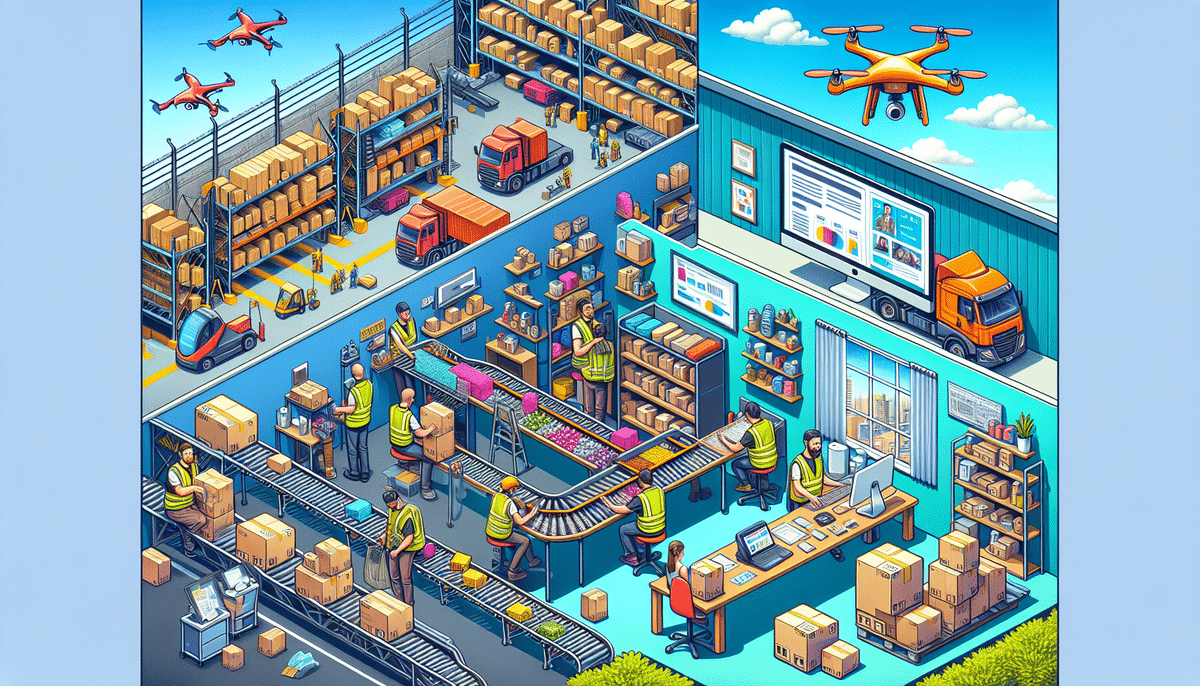Introduction to E-commerce Fulfillment Services
If you're running an e-commerce business, navigating the world of fulfillment services can be daunting. Two of the most popular options are Fulfillment by Amazon (FBA) and ShipBob. In this article, we'll provide an in-depth analysis of both services, comparing their features, costs, and benefits to help you determine which is best suited for your business needs.
Fulfillment by Amazon (FBA)
What is FBA?
FBA is a service offered by Amazon that enables businesses to store and ship their products through Amazon's extensive network of fulfillment centers. When a customer places an order, Amazon handles everything from picking and packing to shipping, handling, and even customer service.
Advantages of Using FBA
- Prime Shipping: Businesses using FBA can offer Amazon Prime shipping, which is a significant selling point for millions of shoppers.
- Cost Savings: By outsourcing fulfillment to Amazon, businesses can save time and money on logistics, allowing them to focus on product development and marketing.
- Discounted Shipping Rates: Amazon’s high-volume shipments enable access to discounted rates with carriers, which can be particularly beneficial for small businesses.
According to a Statista report, Amazon's fulfillment services continue to grow, reflecting their importance in the e-commerce landscape.
ShipBob Fulfillment Services
What is ShipBob?
ShipBob is a third-party logistics (3PL) provider that offers comprehensive warehousing, picking, packing, and shipping services for e-commerce businesses. Unlike FBA, ShipBob provides the flexibility to store inventory across multiple locations, reducing shipping times and costs.
Key Features of ShipBob
- Real-Time Inventory Tracking: ShipBob offers advanced inventory tracking and analytics, giving businesses greater visibility into their operations.
- Value-Added Services: Services like kitting, assembly, custom packaging, and returns management enhance the overall customer experience.
- Customization: ShipBob allows for customizable packaging options, helping businesses create a unique unboxing experience for their customers.
ShipBob's integration with multiple sales channels makes it a versatile option for businesses looking to expand beyond a single marketplace.
Comparing FBA and ShipBob
Benefits
FBA: Offers seamless integration with Amazon, access to Prime shipping, and Amazon's customer service. It is ideal for businesses looking to leverage Amazon's vast customer base.
ShipBob: Provides greater customization, multiple warehouse locations for faster shipping, and enhanced control over inventory and packaging. Suitable for businesses seeking flexibility and multi-channel fulfillment.
Cost Comparison
Both FBA and ShipBob charge for storage and fulfillment, but their pricing structures differ. FBA fees are based on storage space and the size and weight of products, potentially increasing costs for high-volume businesses. ShipBob offers transparent, flat-rate pricing per order, which can be more predictable and cost-effective, especially for businesses with smaller or lighter products.
For example, according to a Business News Daily article, businesses often find ShipBob's pricing more manageable and easier to budget compared to FBA's variable fees.
Shipping and Handling
FBA: Utilizes Amazon's fulfillment network to ensure fast and reliable shipping. Primarily designed for sellers on Amazon's platform.
ShipBob: Offers multiple warehouse locations across the U.S. for faster shipping to customers. It also supports international shipping options, providing flexibility to e-commerce businesses operating globally.
Storage and Warehousing
FBA: Leverages Amazon's extensive network of fulfillment centers, offering climate-controlled storage and automated inventory management.
ShipBob: Allows businesses to distribute inventory across various warehouses to optimize shipping times and costs. Provides real-time inventory updates and advanced warehousing solutions.
Product Handling and Order Management
FBA: Handles all aspects of order fulfillment, including picking, packing, labeling, and shipping. Limited control over the process as Amazon manages it entirely.
ShipBob: Provides customizable packaging options, such as branded inserts and custom boxes. Offers real-time order tracking and analytics to help businesses manage their operations efficiently.
Customer Service
FBA: Amazon manages customer service and returns, providing a reliable support system but limiting direct interaction with customers.
ShipBob: Offers dedicated account managers to assist businesses with any issues or concerns, providing a more personalized customer service experience.
Choosing the Right Fulfillment Provider
Factors to Consider
- Pricing: Analyze the fee structures and determine which provider offers the most cost-effective solution for your business model.
- Shipping Needs: Consider your shipping volume, destinations, and speed requirements. Choose a provider that aligns with your logistical needs.
- Customization: If branded packaging or specific handling is important, select a provider that offers these options.
- Scalability: Ensure the provider can scale with your business growth and handle increased order volumes.
- Integration: Verify that the fulfillment service integrates seamlessly with your e-commerce platforms and tools.
Assessing Business Needs
Every e-commerce business has unique requirements based on its products, target market, and growth plans. It's essential to assess your specific needs and choose a fulfillment provider that can support your business objectives and provide the necessary flexibility.
Case Studies and Expert Insights
Case Study: Efficiency Boost by Switching to ShipBob
A small e-commerce business experienced a 30% reduction in shipping times and a 20% decrease in fulfillment costs after transitioning from FBA to ShipBob. By utilizing multiple warehouse locations, the business was able to serve customers more efficiently and enhance overall satisfaction.
Expert Insights: Best Fulfillment Options for Small Businesses
Industry experts suggest that FBA is ideal for small businesses seeking immediate access to Amazon's customer base and the benefits of Prime shipping. In contrast, ShipBob is favored by businesses that require more control over their fulfillment process and seek multi-channel flexibility.
According to a Shopify blog, choosing the right fulfillment partner can significantly impact your business's operational efficiency and customer satisfaction.
Conclusion: Making the Right Choice Between FBA and ShipBob
Choosing between FBA and ShipBob depends on your business's specific needs. FBA offers robust support through Amazon's established network, ideal for businesses leveraging Amazon's marketplace. ShipBob provides greater customization and control, suitable for businesses operating across multiple sales channels.
By carefully evaluating factors such as pricing, shipping requirements, customization needs, and scalability, you can select the fulfillment service that best aligns with your business strategy and sets you up for success in the competitive e-commerce landscape.








